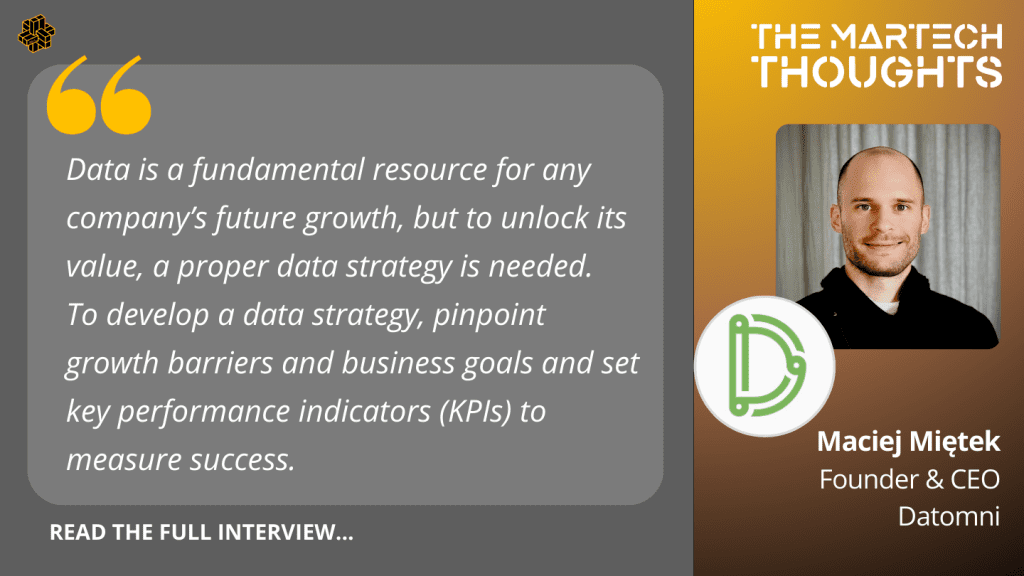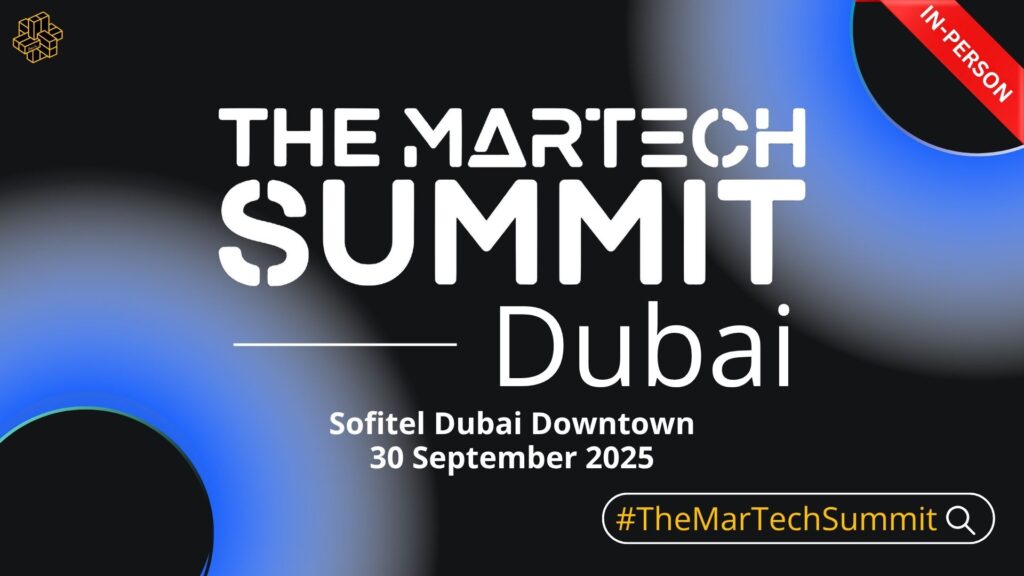
Welcome Maciej Miętek, Founder & CEO at Datomni, shares insights on how Data Strategy and Automation drive business growth as part of the MarTech Thoughts series.
How do you describe your job to a 5-year-old?
Imagine you’re a super-smart wizard who can see and understand everything a company does. You can see how much money it makes, how it grows, and what works well or not, down to the smallest detail. You use your magic to help the company by giving advice and even making things happen automatically, like magic robots doing tasks for them. That’s what we do, but instead of magic, we use special computer programs called analytics systems to help companies understand their operations and grow!
What is the one marketing platform/app/solution you can’t live without? Why?
Snowplow is essential to our multi-tenant analytics stack. It captures and processes customer and marketing events in real-time at scale. Its event validation ensures that only high-quality, structured data moves through our system. We send this data to our own and our clients’ warehouses and forward it to platforms like ad networks and marketing tags. We also use Snowplow to generate real-time metrics and dashboards that drive key decisions for our clients, such as optimizing marketing budgets across channels.
What challenges do you see in processing data coming from different sources? How to overcome?
There are many challenges we encounter when dealing with processing data from multiple sources. First, varying formats and structures require standardization into a unified data model. Raw data is typically low quality and needs to pass through cleansing, enrichment, and validation. All data sources may use different identifiers for the same people, adding to the challenge of identity resolution. Consent or privacy levels associated with a specific data set may not be clear. Changing data sources and event structures increase the need for ongoing maintenance.
To address data processing challenges from various sources:
- Build a strong tracking plan outlining events, properties, validation schemas, and value examples.
- Create detailed documentation of data sources and pipelines, including data flow, transformations, and enrichment processes.
- Build a unified data model for your metrics.
- Implement real-time schema validation to ensure data integrity before ingestion to the warehouse.
- Use automated pipelines for data cleaning, validation, and enrichment.
- Apply identity resolution techniques to link data accurately across sources.
- Set up monitoring on your data pipelines to detect and resolve issues promptly.
- Implement maintenance mechanisms to ensure you stay on top of changing data source schemas and adapt your system accordingly.
What key elements do you consider when developing a data strategy? What role do you see data playing in your company’s future growth?
Data is a fundamental resource for any company’s future growth, but to unlock its value, a proper data strategy is needed.
To develop a data strategy, pinpoint growth barriers and business goals and set key performance indicators (KPIs) to measure success.
Once you’ve made the key business decisions that will guide your data strategy, focus on the detailed decisions for each individual layer as follows:
- Infrastructure: Choose between on-premise or SaaS data infrastructures and decide on real-time vs. batch processing.
- Data capture: Determine whether to collect data client-side or server-side, identify data sources, and how to manage consent in each data source.
- Collection and enrichment: Select validation and enrichment methods for each data source and pipeline.
- Warehousing: Pick storage technologies and set data granularity and freshness requirements for warehoused data.
- Business intelligence: Define dashboard requirements, data freshness, update frequency, and user access, including sharing permissions and visibility rules.
- Data activation: Identify data destinations and associate them with specific data sources.
Using this outline, you will create a robust data strategy that covers both high-level requirements for the entire system and its components. This approach will help you optimize operations and lead to better customer experiences.
Can you describe a successful campaign or initiative that used CDP data for personalization?
A leading Polish brand in child education is enhancing customer engagement across its offline play center and e-commerce shop by creating a personalized, integrated experience. Using Omni CDI/our CDP system, we establish a unified identity resolution system that links offline and online interactions under a single pseudonymous ID. By implementing tracking across both channels and building metric models, we develop lifetime metrics and attributes based on user activities, such as preferred product categories. This data enables us to design targeted upsell paths via email, promoting relevant e-commerce products to customers who engage with specific experiences at the offline center. For example, visitors to the play center receive offers for products that replicate those experiences at home, maximizing cross-selling opportunities.
What’s the best advice someone has ever given you?
Strike up more random conversations with people.
Any fun facts about yourself that you want to share?
Together with a couple of friends, I organized a spontaneous trip to the heart of Iringa, Tanzania, where we taught local university students the basics of analytics and MarTech.
Are there any questions you’d like to ask to other MarTech enthusiasts?
How can we accelerate the adoption of customer data platforms at SMBs?
A big thank you to Maciej Miętek, Founder & CEO at Datomni,, he shares his expert insights on Data Strategy and Automation drive business growth. If you want to connect with Maciej, feel free to reach out via LinkedIn!
See more MarTech Thoughts interview pieces here!
Last updated: October 2024













